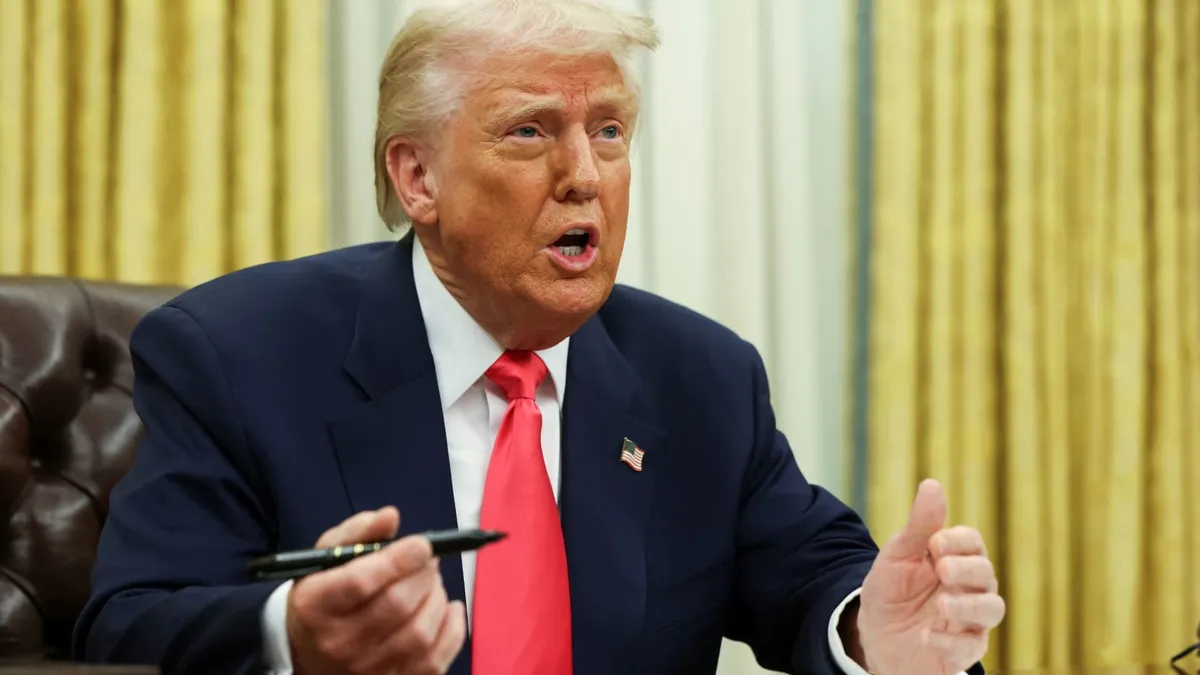
U.S. President Donald Trump has recently expanded his tariff pause on goods imported from Canada and Mexico. This move is conditional upon compliance with the United States-Mexico-Canada Agreement (USMCA), a significant trade deal involving all three countries. This decision contrasts sharply with Trump's previous reprieve for automakers, which had a positive impact on stock prices. However, this time, investors reacted negatively, leading to a downturn across all major U.S. benchmarks. The Nasdaq Composite even entered correction territory, losing all gains achieved post-election.
The ongoing approach of the Trump administration towards tariffs has raised concerns, as it appears to be doubling down despite acknowledging the potential repercussions of such levies. Trump has publicly dismissed worries about market conditions, much to the dismay of investors who had hoped for what is often referred to as the Trump put—the belief that the president would intervene to prevent significant declines in stock prices.
According to a White House official, goods imported from Canada and Mexico that meet the terms of the USMCA will be temporarily exempt from President Trump's 25% tariffs. This exemption is expected to impact approximately 38% of imports from Canada and around 50% from Mexico. The reprieve will remain in effect until April 2, providing some relief amid ongoing trade tensions.
In related international trade news, China's export growth has shown signs of slowing. Between January and February, exports rose by just 2.3% in U.S. dollar terms, a significant drop from the anticipated 5% increase projected in a recent Reuters poll. This figure is also considerably lower than the 10.7% growth recorded in December. Chinese Minister of Foreign Affairs, Wang Yi, urged the U.S. to avoid arbitrary tariffs and emphasized the need for peaceful coexistence between the two nations.
On another front, President Trump signed an executive order establishing a Strategic Bitcoin Reserve. According to David Sacks, the White House crypto and AI czar, this reserve will be funded solely with bitcoin obtained through criminal and civil forfeiture cases. The order also introduces a U.S. Digital Asset Stockpile, managed by the Treasury Department, to hold other confiscated cryptocurrencies. Following this announcement, bitcoin prices experienced a decline, falling to as low as $84,688.13, disappointing investors who anticipated proactive purchasing of the digital currency.
When questioned about the tariff pause's influence on the stock market, Trump claimed he is not monitoring market fluctuations. He expressed confidence that the U.S. will remain strong in the long term, attributing recent equity losses to globalist countries and companies.
During a speech at the Economic Club of New York, U.S. Treasury Secretary Scott Bessent stated that access to cheap goods does not define the American dream. He outlined Trump’s view on tariffs, emphasizing their role as a revenue source for the government, a means of protecting American industries and workers from unfair practices worldwide, and a tool for negotiation in trade matters.
In a troubling development, U.S. employers announced a staggering 172,017 layoffs in February, marking a 245% increase from the previous month— the highest monthly count since July 2020, during the pandemic. Notably, more than one-third of these layoffs can be attributed to actions by billionaire Elon Musk, who has sought to reduce the federal workforce with Trump's support.
The fluctuations in tariffs have led to growing frustration among investors, reflected in a significant decline in U.S. stock markets on Thursday. The S&P 500 fell by 1.78%, while the Dow Jones Industrial Average decreased by 0.99%. The Nasdaq Composite plummeted 2.61%, entering correction territory as it lost 10% from its recent high, effectively erasing all post-election gains. Following this trend, Asian markets also followed Wall Street’s downward trajectory, with Japan's Nikkei 225 dropping 2.25%.
In Europe, the European Central Bank announced a 25 basis point cut to interest rates on Thursday, adjusting its monetary policy to become less restrictive. This reduction brings the ECB's deposit facility rate to 2.5%, a move anticipated by market analysts before the announcement. ECB President Christine Lagarde noted that the decision faced no opposition from the Governing Council, although one central bank governor chose to abstain.
Finally, the semiconductor sector is facing challenges, as an ETF tracking a range of semiconductor companies has seen a double-digit decline in recent weeks, contrasting sharply with a 38.5% increase in 2024. This recent downturn has formed a concerning chart pattern, the first of its kind in over two years, indicating potential further difficulties ahead for investors in this sector.